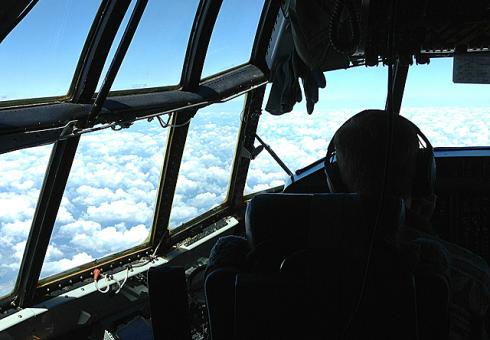Keeley Rafter
Engineering Systems Division
Noelle Selin, assistant professor of engineering systems and atmospheric chemistry, along with Amanda Giang (Technology and Policy Program graduate) and Shaojie Song (Department of Earth, Atmospheric and Planetary Sciences PhD student), recently traveled aboard the specialized NCAR C-130 research aircraft as part of a mission to measure toxic pollution in the air.
The team participated in the Nitrogen, Oxidants, Mercury and Aerosol Distributions, Sources and Sinks (NOMADSS) project. The NOMADSS project integrates three studies: the Southern Oxidant and Aerosol Study (SOAS), the North American Airborne Mercury Experiment (NAAMEX) and TROPospheric HONO (TROPHONO). Selin’s group focuses on the mercury component.
“Mercury pollution is a problem across the U.S. and worldwide,” Selin says. “However, there are still many scientific uncertainties about how it travels from pollution sources to affect health and the environment.”
Selin and her students used modeling to inform decisions about where the plane should fly and to predict where they might find pollution. Their collaborators at the University of Washington aboard the aircraft captured and measured quantities of mercury in the air, conducting a detailed sampling in the most concentrated mercury source region in North America.
“It was really exciting to experience first-hand how measurements and models could support each other to address key uncertainties in mercury science,” Giang says.
The main objectives of this project include constraining emissions of mercury from major source regions in the United States and quantifying the distribution and chemical transformations of mercury in the troposphere.
NOMADSS is part of the larger Southeast Atmosphere Study (SAS), sponsored by the National Science Foundation (NSF) in collaboration with the National Oceanic and Atmospheric Administration, the U.S. Environmental Protection Agency and the Electric Power Research Institute. This summer, the Southeast Atmosphere Study brought together researchers from more than 30 universities and research institutions from across the U.S. to study tiny particles and gases in the air from the Mississippi River to the Atlantic Ocean, and from the Ohio River Valley to the Gulf of Mexico. The study aims to investigate the relationship between air chemistry and climate change, and to better understand the climate and health impacts of air pollution in the southeastern U.S.
News and Outreach: Shaojie Song
In The News
MIT News

